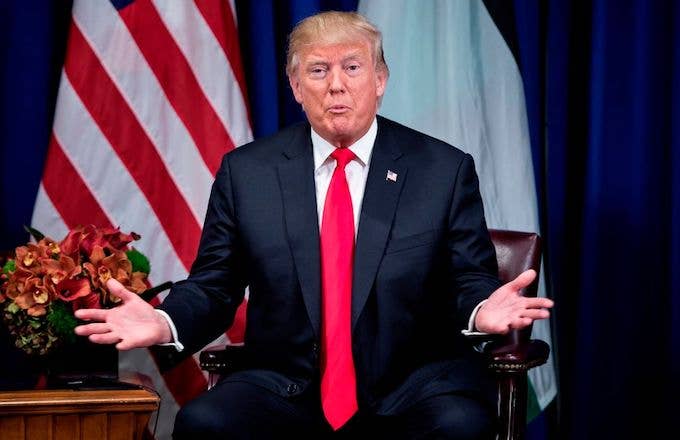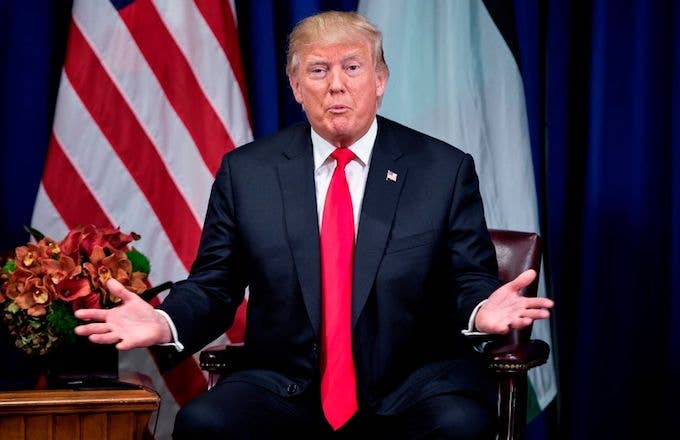
On Sunday the Trump administration made an announcement that they'd be imposing new restrictions on eight different countries, which was an expansion upon their already controversial travel ban that used an executive order to deny visas to citizens from six predominantly Muslim nations (Iran, Libya, Somalia, Sudan, Syria and Yemen).
On Sunday that ban officially expired, leading to this new roll-out that represents a replacement to a main portion of the previous one, and will restrict foreign travel from: Chad, Iran, Libya, North Korea, Somalia, Syria, Venezuela and Yemen.
As you can see three of those countries are new, though it should be noted that Venezuela's restrictions are specifically worded to target the leadership of that country as well as their families. Additionally, the ban will be phased-in. People who, say, live in one of these countries but are also a grandparent of a U.S. citizen will be able to apply for visas up until October 18. After that, travel restrictions will go into effect.
Furthermore, currently valid travel documents and visas will not be revoked.
If you're wondering what this means specifically, according to CNN, "In most instances, travel will be broadly suspended, while in other cases, travelers will have to undergo enhanced screening and vetting requirements." Also North Korea and Syria will be the recipients of the most extreme restrictions, with all citizens from those places being denied entry.
Not surprisingly, on Sunday night Trump tweeted about the revised ban:
Back in January, Trump's original ban (which prevented entry from seven different countries, and refugees worldwide) was blocked in court, but the president signed a revised version that removed Iraq from the prohibited nations while leaving the other six. That revised version was also blocked, but the Supreme Court allowed it to go through with an alteration that allowed exemptions for people with a "connection" to the U.S., including those with family or a firm job offer in the states.
That ban on citizens was set to last 90 days (which, like we said, ended today) and that ban on refugees was set to last 120 days (meaning that ban will expire on October 24). It is not yet clear how this new version, which appears to be indefinite, will impact refugees, with officials saying that rules for them would be unveiled in the next few days.
The Supreme Court has already scheduled arguments to determine whether the ban is legal. Those will be held on October 10.
According to the Washington Post, the administration stated that they decided to include these eight countries because they denied requests that other foreign governments had accepted—like, for instance, "[sharing] terrorism and criminal-history information." They also said that other governments have agreed to "make changes and share more data." Those working in the administration also claimed the ban came about after an evaluation of the security capabilities of the nation's on the list, and made sure to note that it included "non-Muslim countries" in a clear effort to deny the opposition narrative that it's a "Muslim ban."
As was the case with the abrupt and poorly presented original version, which you may remember caused loads of chaos in U.S. airports, this new edition is already being met with immediate opposition.
"President Trump’s latest attempt at a ‘Muslim ban,’ like all the others, undermines fundamental American and Jewish values with its explicit bigotry and xenophobia," Stosh Colter, the chief executive of Bend the Arc Jewish Action, told the New York Times. "These immoral restrictions, which make no actual contribution to protecting our country, send an unmistakable message to Muslims and immigrants in the United States and around the world: 'You are not welcome here.'"
Additionally, the ACLU made their objection abundantly obvious:
In a longer rebuttal than a tweet would allow for, Anthony Romero, the ACLU's executive director, also added that this new move is "an apparent effort to paper over the original sin of the Muslim ban, especially when just last week Trump said he wanted a 'larger, tougher, more specific' ban."
Not that you would, but don't expect this to be the last you've heard about this.

